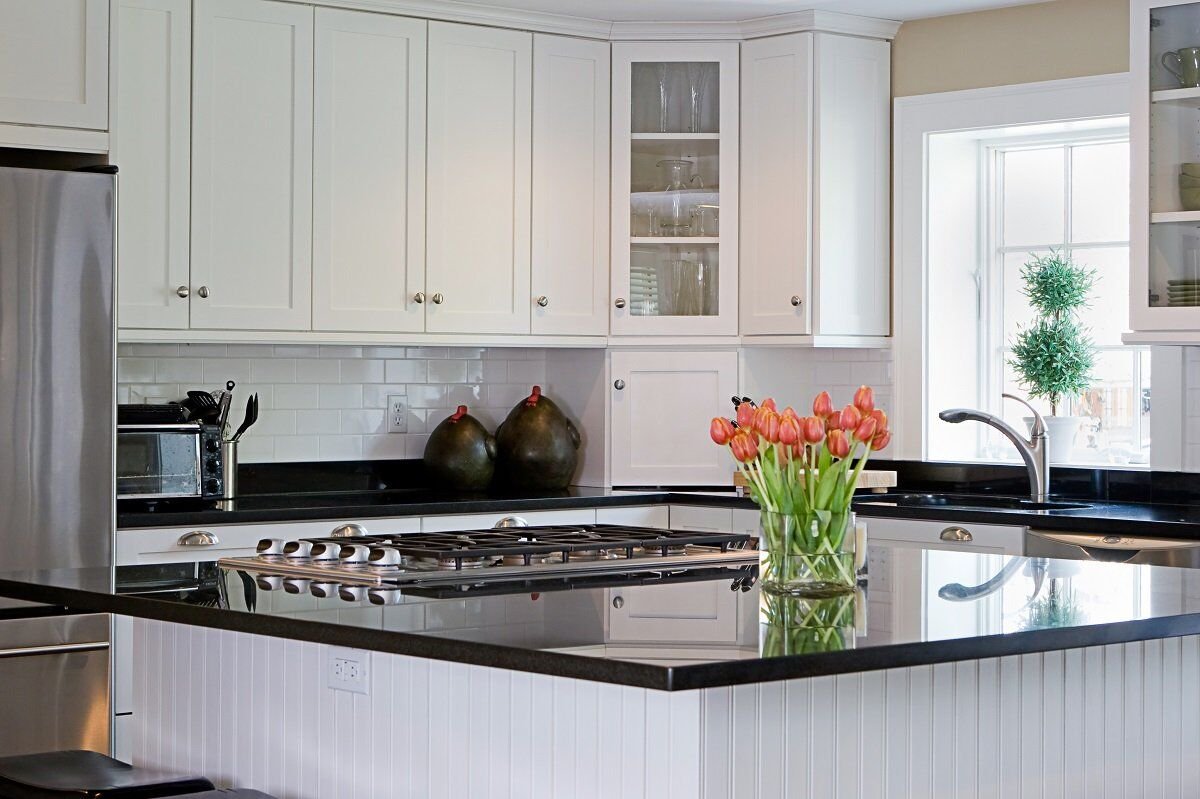Granite kitchen counters typically range from 1¼ inches to 3 centimeters thick. This thickness ensures durability while showcasing the natural beauty of the stone.
You’ll find this standard thickness in most homes, along with some variations depending on the type of granite and personal preference. Standard thickness balances style and practicality.
Knowing the exact measurements helps you make informed decisions for your kitchen renovation project. So, how thick is a granite kitchen counter? Now you know the essentials to start planning confidently.
How Thick is Granite Kitchen Counter
Granite kitchen counters are a popular choice in many homes because they offer an elegant and durable surface. One of the key aspects to consider when choosing a granite countertop is its thickness. So, how thick is a granite kitchen counter? In this article, we’ll take a detailed look at the different thicknesses available and how they can impact the look, feel, and function of your kitchen. We’ll also address important subtopics such as the pros and cons of various thicknesses, cost considerations, and how to properly maintain your granite countertop.
Standard Thickness Options for Granite Kitchen Counters
When it comes to granite countertops, the thickness can vary, but there are three standard options:
- 2 centimeters (cm)
- 3 centimeters (cm)
- 4 centimeters (cm) or more
Each thickness has its own set of characteristics and benefits.
2 Centimeter Granite Countertops
Granite countertops that are 2 centimeters thick (about 3/4 of an inch) are the thinnest option available. They are often used in areas where a lightweight solution is needed or where budget constraints are a primary concern.
Pros:
– **Cost-Effective**: This option generally costs less than thicker slabs.
– **Lighter Weight**: Easier to handle and install.
Cons:
– **Less Durable**: More susceptible to chips and cracks.
– **Requires Support**: Often needs additional support or backing to prevent sagging.
3 Centimeter Granite Countertops
Granite countertops that are 3 centimeters thick (about 1 1/4 inches) are the most common choice for residential kitchens.
Pros:
– **Increased Durability**: Thicker slabs are more resistant to damage.
– **Aesthetic Appeal**: Provides a luxurious, high-end look.
Cons:
– **Heavier Weight**: Requires sturdy cabinetry and professional installation.
– **Higher Cost**: More expensive than thinner options.
4 Centimeter Granite Countertops and Beyond
Granite countertops that are 4 centimeters thick (about 1 1/2 inches) or more are typically custom-made and offer a very robust and substantial appearance.
Pros:
– **Superior Strength**: Extremely durable and resistant to damage.
– **Luxurious Look**: Adds a sense of grandeur to any kitchen.
Cons:
– **Very Heavy**: Requires significant structural support.
– **Premium Price**: The most expensive option.
Impact of Thickness on Granite Countertop Appearance
The thickness of your granite countertop can significantly affect the overall appearance of your kitchen. Here’s how each option can change the look:
- 2 cm Granite: Offers a sleek and modern look, but may appear less substantial.
- 3 cm Granite: Strikes a balance between elegance and modernity, offering a classic look.
- 4 cm Granite or More: Provides a very opulent and dramatic appearance, perfect for luxury kitchens.
Practical Considerations: Weight and Installation
Choosing the right thickness for your granite kitchen counter also depends on practical aspects like weight and installation:
Weight Concerns
Granite is a dense and heavy material. As the thickness increases, so does the weight. A typical 3 cm granite slab can weigh around 18-21 pounds per square foot. Compare this to a 2 cm slab, which weighs about 13-15 pounds per square foot.
Your cabinetry must be able to support the weight of your chosen granite slab, especially for thicker options like 4 cm slabs. Structural reinforcement might be necessary, especially in older homes.
Installation Process
Professionals should install granite countertops to ensure proper fitting and avoid potential damage. Installing thicker slabs requires greater skill and more tools:
- **2 cm Granite:** Easier to cut and maneuver, making it a bit simpler to install.
- **3 cm Granite:** The standard thickness that most installers are accustomed to working with.
- **4 cm Granite:** Requires specialized tools and techniques due to its weight and thickness.
Cost Implications of Granite Thickness
The thickness of your granite countertop affects not only its appearance and durability but also the cost. Here’s a breakdown of how thickness impacts price:
2 cm Granite
Generally, the most affordable option. The cost per square foot ranges from $40 to $60, excluding installation. However, you may need to spend extra on additional support structures, which can add to the overall price.
3 cm Granite
A mid-range option, 3 cm granite typically costs between $50 and $80 per square foot, excluding installation. This thickness often requires fewer additional supports, which could save on extra costs.
4 cm Granite
The premium choice, 4 cm granite can range from $70 to $100 or more per square foot, excluding installation. The luxurious look and enhanced durability often justify the higher price for those seeking a high-end kitchen.
Maintenance Considerations for Various Thicknesses
Maintaining a granite countertop involves regular cleaning and occasional sealing. However, maintenance needs can vary depending on the thickness of the granite.
2 cm Granite
Due to its thinner profile, 2 cm granite is more likely to chip or crack, requiring you to be extra cautious. Regular cleaning with mild soap and water is essential, and sealing every 6-12 months helps maintain its longevity.
3 cm Granite
This standard thickness offers a balance between durability and maintenance needs. Regular cleaning remains essential, but the 3 cm slabs are less prone to damage. Sealing every 12-18 months usually suffices.
4 cm Granite
Thicker slabs like 4 cm granite are highly durable but not immune to damage. The maintenance routine largely remains the same—regular cleaning and sealing every 12-18 months. However, their substantial nature means they are less likely to chip or crack.
Customization and Edge Profiles
The thickness of your granite countertop also plays a role in the type of edge profiles you can choose. Edge profiles add a decorative finish to your countertop, and certain profiles are more suitable for thicker slabs.
2 cm Granite Edge Profiles
Due to the thinner slab, edge profiles for 2 cm granite are often limited to simpler designs. Popular choices include:
- **Straight Edge:** Offers a clean, modern look.
- **Bevel Edge:** Slightly angled for a subtle decorative touch.
3 cm Granite Edge Profiles
Thicker slabs like 3 cm granite provide more options for edge profiles, including:
- **Bullnose:** Rounded for a smooth, finished look.
- **Ogee:** An elegant, S-shaped curve, adding a sense of sophistication.
- **Dupont Edge:** Features a straight edge that transforms into a bullnose, offering a unique appearance.
4 cm Granite Edge Profiles
With 4 cm granite, you can explore intricate and ornate edge profiles without worrying about compromising the slab’s integrity. Options include:
- **Triple Pencil:** Features three cascading rounded edges for a luxurious look.
- **Chiseled Edge:** Provides a rustic, natural appearance perfect for farmhouse kitchens.
Choosing the Right Thickness for Your Needs
Selecting the right thickness for your granite kitchen counter depends on several factors:
- **Budget:** Thinner slabs are more cost-effective but may require additional support structures.
- **Durability:** Thicker slabs offer increased durability and are less prone to damage.
- **Aesthetic:** The thickness of the slab can significantly impact the overall look and feel of your kitchen.
- **Weight and Installation:** Ensure your cabinets can support the weight, and consider the complexity of installation.
By considering these factors, you can make an informed decision that aligns with your needs and preferences.
How granite countertops are made
Frequently Asked Questions
What are the standard thickness options for granite kitchen counters?
Granite kitchen counters typically come in three standard thicknesses: 2 cm (about 3/4 inch), 3 cm (about 1 1/4 inches), and 4 cm (about 1 1/2 inches). The 3 cm thickness is the most common choice for kitchen countertops due to its balance of strength and cost.
How does the thickness of granite affect its durability?
Thicker granite countertops, such as those measuring 3 cm or more, offer greater durability and resistance to cracking or chipping. Thinner options, like 2 cm, may require additional support or reinforcement to prevent damage over time, especially in areas with heavy use.
Can I choose different thicknesses for different areas of my kitchen?
Yes, you can choose different thicknesses for various areas of your kitchen. For example, you might opt for a thicker slab for the main countertops and a thinner slab for an island or bar area. This allows for flexibility in design and functionality.
Does the thickness of granite impact the overall cost of the countertop?
Yes, the thickness of granite significantly impacts the overall cost. Thicker slabs generally cost more due to the additional material and labor required. However, they also provide greater durability and a more substantial appearance, which can be worth the investment.
Are there any industry standards for the thickness of granite used in kitchen counters?
Yes, industry standards typically recommend 3 cm thickness for kitchen counters due to its optimal balance of durability, support, and aesthetic appeal. While 2 cm options are available and sometimes used in less demanding applications, 3 cm is the most common and widely accepted standard.
Final Thoughts
Granite kitchen counters typically come in three standard thicknesses: 2 cm, 3 cm, and 5 cm. Most homeowners prefer the 3 cm thickness for its balance of durability and aesthetic appeal. Thinner slabs like 2 cm often require plywood support, while 5 cm granite offers a more luxurious feel.
When choosing, consider both your budget and the overall style of your kitchen. By understanding how thick is granite kitchen counter, you can make an informed decision that best suits your needs and preferences.

